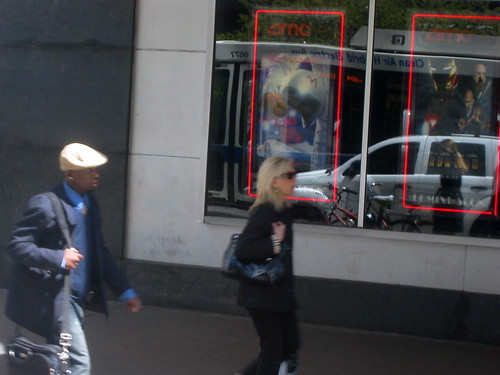
Two Frames, Red
The daily daily intercedes to gum up (or nearly gum out) the usual rhythm, Babatunde Olatunji-style. There’s the downpour of rain, the dog cowering to the thunderclaps circling the house, coming in circumferentially unhesitant, layering up a conga storm. There’s the sorry rumba of a physical, reflexes, check, tetanus booster, check, pertussis (“whooping cough without the whoop”) making a comeback in grownups, check. Plates falling off the human table, the usual squamous interceptors that work to rout the quotidian. Or make the quotidian a rout. What one dodges to (in order to) render out of a day something to spit in the brain-pan’s fires. Is it Maggie Nelson’s language or landscape (guck’d up urban wastes, unintend’d dumps and scavenge-lands, blooming with detritus) that thrills me so?
. . . A bird shakes ashesThat out of the September part of a long and wonderful piece titled “The Canal Diaries,” in Nelson’s Something Bright, Then Holes (Soft Skull, 2007). Lyrical licks in a journal setting (like points of turquoise hammer’d into a silver band). Sudden upsuck of breath for lines like “the cement crusher’s / mean lavender dust”—is it the sudden peculiarity of the “mean” or the precision of the color “lavender”? “My lettuce-colored cup / runs empty.” Or the subject (“myself”) bluntly full of its own subjectivity, with no apology, a wuttering fat sleekit dove of subjectivity:
from its wings, a clump
of red dahlias
lies at the edge, as if
something died here
and it did. A pair of doves
picks at a rusty engine
as the sun illumines
a glut of polliwogs
moving like intelligent, brown
sperm. . . .
I charge myself withChicanery and vastness. Meaning, obviously “working” the Big Questions, and with a tamp’d down lingo (look at the “fit” of “beget,” “forgetfulness,” “met”—a drawstring pulling the lines taut) to assuage any splay, quell any leaning toward sprawl. There’s something fierce and fearless in Nelson’s work, the concerns hardly petty, the approach eschewing modishness, the world stuck center-stage where it ought be, unguy’d by rope or ruse.
impatience, chicanery
then call you for
the diagnosis
You say it’s just the spirit
looking out for its own
vastness, yes
But still I envy
all those who are hungry
and get fed, all those
who still use recreational drugs
Those happy & fat with child
Those who tell the truth
and delight in it, those who believe
in a compassionate
wilderness, those
whose bodies beget
an absolute forgetfulness.
Have you ever met
one of those people
who can pick out any tune
on any instrument, then
fill the night with sound?
